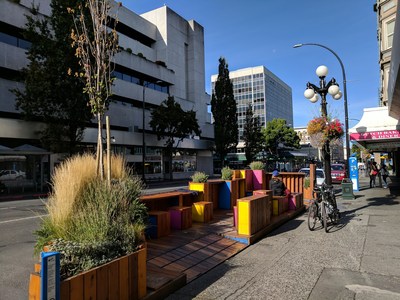|
27.09.2017 23:00:00
|
Connecting Land Use and Transportation is Key to Reducing GHG Emissions in Cities, Towns, Regions
Smart Growth Task Force report lists 10 recommendations to strengthen BC Climate Action Charter
VANCOUVER, Sept. 27, 2017 /CNW/ - Ten years ago, the Province of BC, the Union of BC Municipalities, and local governments signed the BC Climate Action Charter, a pledge to work together to address climate change. To achieve emissions reductions, local governments agreed to take action (with provincial support) towards "creating complete, compact, more energy efficient rural and urban communities."

A report released today by the Real Estate Foundation of BC (REFBC) finds that little progress has been made in shifting travel to public transit, walking and cycling. Despite commitments to reduce total greenhouse gas (GHG) emissions by 33% below 2007 levels by 2020, GHGs associated with personal transportation (the largest GHG contributor in BC) remain near 2007 levels.
The report recommends strengthening the Charter's smart growth foundations by better integrating land use and transportation planning in BC communities.
"The connection between land use and transportation is often overlooked in climate strategies," says REFBC CEO Jack Wong. "Accommodating population growth in existing neighbourhoods helps to support diverse housing and transportation options that, in turn, lower municipal infrastructure costs and reduce community GHG emissions."
While the BC government has steadily increased spending on transit, these investments have been outpaced by spending on infrastructure that supports personal vehicle travel. The report finds that, for every $1 spent on transit between 2008 and 2011, $4.50 was spent on roads and bridges. For 2017 to 2020, road and bridge spending is projected to increase to $6.50 for every $1 allocated to transit.
Stronger integration of land use and transportation planning will help the Province meet its climate action targets. To support this, the report makes 10 recommendations to provincial ministries.
Recommendations include:
- Use market-based tools to expand transportation choice and more fairly share the costs of transportation infrastructure.
- Update community GHG reduction targets and provide provincial support to meet them.
- Reinvest in BC's Community Energy and Emissions Inventory (CEEI) system to provide defensible transportation sector data.
The report was commissioned by the Real Estate Foundation of BC as part of its research on sustainable built environments in British Columbia. The report was prepared by Boston Consulting, with review and consultation from the Smart Growth Task Force.
Growing Smarter: Cornerstones or Highly Prosperous, Low Carbon Communities
Download the report at bit.ly/growing-smarter
About the Real Estate Foundation of BC:
The Real Estate Foundation of BC is a philanthropic organization that helps advance sustainable land use in British Columbia. It provides grants to non-profit organizations working to improve B.C. communities and natural environments through responsible and informed land use, conservation and real estate practices. Its funding programs support research, education, and law and policy reform. Since 1988, the Foundation has approved more than $75 million in grants. The Foundation also conducts research and special projects to support collaboration and knowledge-sharing around land use.
Learn more at www.refbc.com.
SOURCE Real Estate Foundation of BC
 Der finanzen.at Ratgeber für Aktien!
Der finanzen.at Ratgeber für Aktien!
Wenn Sie mehr über das Thema Aktien erfahren wollen, finden Sie in unserem Ratgeber viele interessante Artikel dazu!
Jetzt informieren!